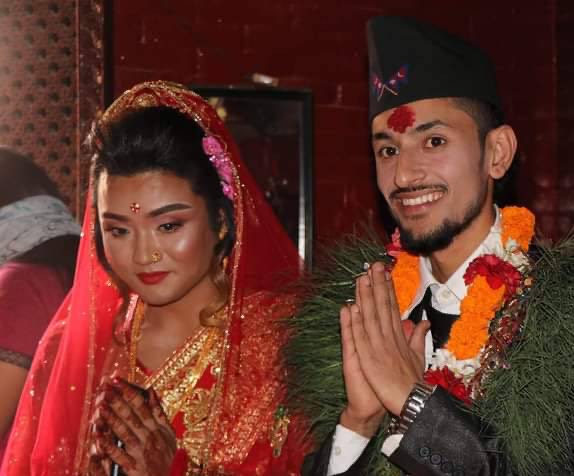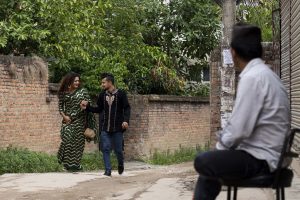“We are going to fight until the very end!” said Surendra Pandey, the husband of Maya Gurung, when we met at a restaurant in Nepal’s busy capital Kathmandu. Frequent power outages, with lights and music turning on and off at irregular intervals, seem to provide an appropriate backdrop to the legal rollercoaster Maya and Surendra endured over the last few weeks.
The couple of eight years, who are now at the center of the legal battle for LGBTQ rights in Nepal, married six years ago during a traditional Hindu ceremony at the prominent Sohrakhutte Paknajol Ganesh Temple in Kathmandu, where they vowed to each other to stay together for the duration of seven reincarnations.
As Hinduism and Buddhism are non-centralized religions, and their traditions of matriarchal origins recognize as many as six different genders, non-traditional unions are not uncommon in the temples of Nepal. The marriage of Mr. Pandey and Mx. Gurung – who still has a male ID but identifies as a third-gender person and uses female pronouns – was no different, with the father and the aunt of the bride, as well as friends, the LGBTQ community, and even bystanders taking part in the colorful celebration.
Our conversation with the couple is translated by a former Nepali lawmaker Sunil Babu Pant, the most prominent LGBTQ activist in Nepal, who has supported the couple in their efforts to register their marriage. Pant highlights that it is marriage inequality that would actually be difficult to reconcile with Nepali tradition. “Marriage is between two souls, and there is no guarantee that one will reincarnate with the same gender. So what then?” he pointed out.
The religious ceremony which the couple underwent, however, is not identical to the legal recognition of the marriage which covers parental rights, allows the joint ownership of properties, bank accounts and inheritance procedures, and facilitates caregiving. To that end, the couple joined seven other applicants, who on June 7, petitioned the Supreme Court to allow the registration of their unions.

Surendra Pandey and Maya Gurung at their wedding ceremony in 2017. Photo courtesy: Surendra Pandey and Maya Gurung personal archive.
On June 28, the Supreme Court’s Justice Til Prasad Shrestha issued a groundbreaking interim order, instructing the government to put in place a transitional mechanism allowing the registration of same-sex and other non-traditional marriages (as Nepal, since 2007, officially recognizes three genders – male, female, and other – the ruling effectively allowed six different types of marriage to be registered).
The verdict was met with praise from human rights campaigners both in Nepal and internationally, but it has not changed the reality on the ground.
On July 13, Pandey and Gurung went to the Kathmandu District Court (KDC) to register their union but Justice Madhav Prasad Mainali refused, quoting the 2017 Civil Code, which restricts state-recognized marriage to heterosexual couples. “As the two persons applying to get married through registration are not men and women of different sexes, the court has refused to register the marriage,” the statement from the KDC reads.
As neither of the courts advised where the couple could have their marriage registered, the LGBTQ community found itself in a legal no-man’s land: Yes, Nepal has provisionally legalized non-traditional marriage, but an actual registration of such union is not possible.
The KDC verdict was widely criticized. Bal Krishna Sah, who covers LGBTQ rights for an English-language Nepali daily, The Himalayan Times, explained that the KDC exploited the fact that it has not been named by the Supreme Court as the institution ordered to register non-traditional marriages. “The Kathmandu District Court said: our name is not on the [Supreme Court] verdict so we are not going to register your marriage. And, technically, it is their right,” the journalist conceded.
Pant condemned the KDC’s ruling as a result of ‘‘very lame, cunning play with words and peoples’ lives.”
The couple and their lawyers appealed the decision to the High Court, which now has three options: accept or overturn the decision of the KDC, or pass the case to the Supreme Court again, so it can issue an instruction on how and by which institutions non-traditional marriages are to be registered.
These legal procedures, however, could only result in the enforcement of the interim order from the Supreme Court, which should not be mistaken for an officially adopted law. Pantay and Gurung, and their supporters, stated that they believe their case will have a positive outcome, yet they unanimously agree that years of inaction by subsequent governments are the ultimate reason for the legal limbo in which the Nepali LGBTQ community still resides.
The fight for marriage equality in Nepal dates back to 2007, when disillusioned LGBTQ activists, led by Blue Diamond Society leader, Pant, failed to secure anti-discrimination measures in a constitution drafted in the aftermath of the power struggle between the authoritarian monarchy and pro-democratic organizations. A large part of the LGBTQ community supported the democratic, and ultimately republican, movement.
“My proposals weren’t even tabled, and my former colleagues suddenly did not have time for me. So we decided to go to the Supreme Court,” Pant recalled. The 2007 petition resulted in a ruling that Pant describes today as “fantastic.” Not only was a third gender legalized, but the Supreme Court ordered other branches of government to terminate all discriminatory measures against the LGBTQ community and to establish a committee tasked with analyzing the possibility of legalizing non-traditional marriage in Nepal.
It took Pant three sentences to describe the following 15 years: “The committee was formed, its members even went to Norway to study how same-sex married couples live. In 2015, the committee submitted their report to the government stating that Nepal should implement full marriage equality. Since then, the government and the parliament did nothing.”
Regardless of the recent Supreme Court verdict and almost two decades of waiting, neither of my interviewees expect a swift adoption of a bill resulting in full marriage equality. Pant, who actively campaigns on that issue among the political class, diplomatically described the positions of various parliamentary groups as “lazy support” for the LGBTQ community. He underlined that none of the political parties are openly hostile toward marriage equality, but he also perceives the subject as being silenced due to the challenge non-traditional unions pose to the deeply-rooted Nepalese patriarchy, which over the last two decades has already had to give way to the rising importance of other marginalized groups, most importantly women.
Sah went further, linking the patriarchal order to the fact that the higher echelons of the caste system are significantly overrepresented in Nepali politics, a factor which in his view should be considered as equally important to the traditional parliamentary arithmetic.
“In Nepal, 12.2 percent of the population is of the Hill Brahmin caste, and Chhetri are 16.6 percent. Together, these two castes are known as Khas Arya communities in Nepal which account for 28.8 percent of the population, yet hold 57 percent of seats in the Parliament,” he said, arguing the fact that the privileged castes are “bringing personal bias and communal bias to influence the decision” on LGBTQ rights.
Against this background, the best the Nepali LGBTQ community seems to be hoping for at the moment is a provisional legalization resulting from legal action, which, following the Supreme Court’s decision, seems likely to be eventually enforced by the courts.
Back in the restaurant, I ask Maya and Surendra whether, once they receive their marriage certificate, they will put it on the wall and revert to a private life.
“We are proud to be opening the way to so many other LGBTQIA+ couples,” Maya said, encouraging others to put forward their cases. They plan to continue to support their community but the greatest change the registration will bring will be the possibility of adopting a child – and both are adamant that they would love to start a family.

































